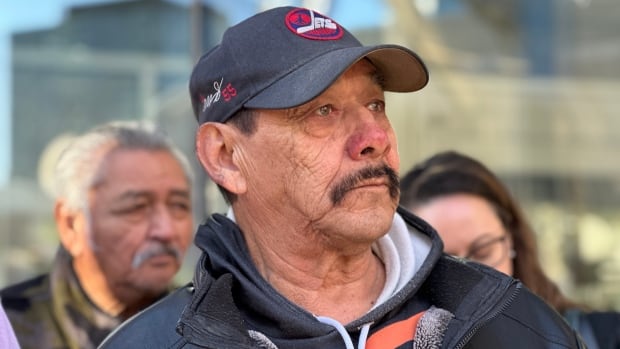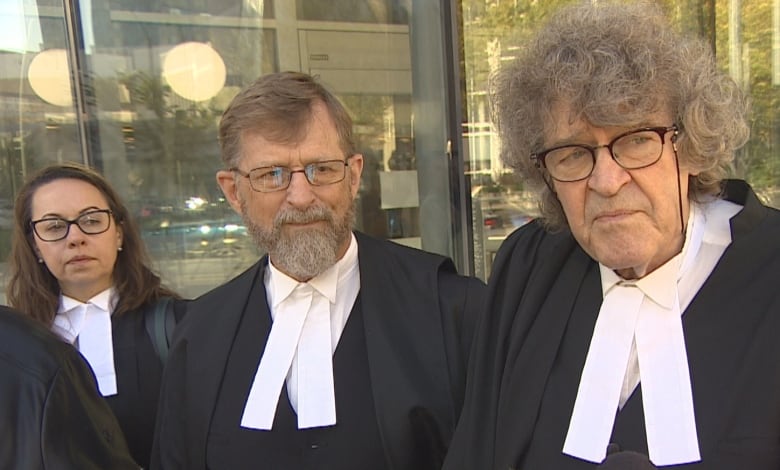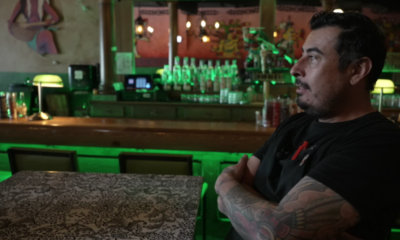News
‘It’s nice to be free,’ Clarence Woodhouse says after exoneration for 1973 Winnipeg murder he didn’t commit

Clarence Woodhouse is a quiet man. However there’s one factor he is at all times made certain to say: He did not do what they claimed.
He mentioned it to the choose who presided over his trial 50 years in the past, after Woodhouse was charged within the homicide of a chef and father of two who was killed in downtown Winnipeg in 1973. He mentioned it to the jury that may later discover him responsible of fatally beating and stabbing Ting Fong Chan, 40, close to a downtown development web site, handing him a life sentence.
And he mentioned it once more in a Winnipeg courtroom on Thursday, when he pleaded not responsible to Chan’s homicide after his unique conviction was overturned and a brand new trial ordered earlier this yr.
Nonetheless, this time somebody mentioned it again.
“You have been wrongfully convicted. You have been harmless,” Manitoba Courtroom of King’s Bench Chief Justice Glenn Joyal advised Woodhouse, now 72, as he acquitted the person who the court docket heard spent 12 years behind bars for a homicide he did not commit earlier than being granted parole.
“There’s nothing I can say to you that gives you again these 12 years — nothing I can say that can right one thing that should not have occurred,” Joyal mentioned, including systemic racism towards the First Nations man “contaminated” the investigation, prosecution and adjudication of Woodhouse’s case and led to the “miscarriage of justice.”
“All I can say from the place that I am now in is I am sorry.”
The replace comes greater than a yr after two of Woodhouse’s co-accused, Allan Woodhouse and Brian Anderson, have been additionally acquitted in reference to Chan’s homicide — following instances court docket heard have been additionally closely influenced by systemic racism towards the First Nations males.
Fifty years after he was convicted of a Winnipeg homicide he by no means dedicated, Clarence Woodhouse of Pinaymootang First Nation has been formally cleared. Manitoba Justice Glenn Joyal advised Woodhouse: ‘You have been wrongly convicted. You have been harmless.’
Strolling out of the Winnipeg courthouse the place he was convicted for what he hopes would be the final time, Woodhouse mentioned he seems like this chapter of his life has lastly come to an finish.
“It is good to be free, eh, in any case these years,” he mentioned, including he is trying ahead to enjoyable and spending time together with his household, together with his grandchildren.
Whereas he is prepared to maneuver on, Woodhouse mentioned he and his household are nonetheless fascinated with his brother, Russell Woodhouse, the fourth man convicted in Chan’s killing. He was sentenced to 10 years behind bars and died in 2011, earlier than the advocacy group Innocence Canada filed an utility to have that conviction reviewed alongside his brother’s.
“He have to be glad from above,” their sister, Linda Anderson, mentioned exterior court docket as Woodhouse’s household celebrated. “I am simply glad that it is over … I thank the Lord for that.”
Jerome Kennedy, one of many legal professionals from Innocence Canada who labored on Woodhouse’s case, mentioned the group is hoping to be again in court docket to take care of Russell Woodhouse’s case “within the not too distant future.”
Crown prosecutor Michele Jules mentioned Chan’s household did not really feel they wanted to be in court docket for Woodhouse’s acquittal, after attending Allan Woodhouse’s and Brian Anderson’s instances final yr, however mentioned they felt “content material and settled” with the result.
‘No credible or dependable proof’: prosecutor
The case towards Clarence Woodhouse, a member of Pinaymootang First Nation, was “nearly fully” primarily based on statements he was mentioned to have made to Winnipeg cops, however proof about police practices on the time and Woodhouse’s familiarity with the English language “undermines their reliability and veracity,” mentioned Jules, who referred to as no proof in court docket Thursday.
For one factor, the usage of violence and intimidation to coerce confessions was a standard downside in police forces within the Seventies, together with in Winnipeg, Jules mentioned. A few of the detectives concerned in Woodhouse’s case have been additionally concerned in different instances the place suspects made comparable claims about their confessions having been manufactured by police, she mentioned.
Woodhouse’s insistence that he was harmless was additionally supported by proof from a forensic linguist who mentioned the extent of English utilized in his obvious confession was inconsistent with the best way he truly spoke in comparison together with his testimony at trial. Courtroom heard Woodhouse, who sat with an interpreter in court docket, speaks Saulteaux.
“It was clear throughout trial that he has issue talking and understanding English … The trial transcripts mirror his very restricted proficiency, a lot in order that the trial choose deemed it essential — with out request from counsel — for Clarence Woodhouse to be supplied the help of an interpreter,” Jules mentioned.
Woodhouse testified he signed a false confession after he was assaulted by cops, however the trial choose and the all-white jury who determined his case did not imagine him, Innocence Canada mentioned in a information launch.
“The conduct of the prosecution fell beneath anticipated requirements, even in 1974,” mentioned Jules, including “there isn’t a credible or dependable proof” to proceed with prosecution towards Woodhouse.
One other Innocence Canada lawyer, James Lockyer, mentioned later Thursday the prosecutor in Woodhouse’s case, George Dangerfield, additionally labored on a variety of high-profile Manitoba homicide instances during which males have been later acquitted or had their expenses quashed — together with these of Frank Ostrowski, Thomas Sophonow, James Driskell and Kyle Unger.
In a press release later Thursday, the Winnipeg Police Service mentioned there have been adjustments within the power within the final 50 years, together with videotaping police statements for main crimes, utilizing devoted forensic investigators within the identification course of and introducing obligatory bias-free and culturally primarily based coaching.
In its personal assertion Thursday, the Meeting of Manitoba Chiefs referred to as on the province to do a complete evaluate of all homicide convictions involving First Nations individuals in mild of Woodhouse’s exoneration.
Activity power wanted for wrongly convicted: legal professionals
The legal professionals behind Woodhouse’s exoneration say they plan to write down to Canada’s justice minister suggesting the creation of a federal job power to look at the best way to establish and tackle different wrongful convictions throughout the nation, notably amongst Indigenous individuals.
“The felony justice system has failed Indigenous individuals. It’s clear that there are different instances on the market,” Kennedy advised court docket, including the duty power ought to work with the provinces and Indigenous leaders, who may also help establish and entry the possibly wrongly convicted out and in of jails and prisons.

Whereas that will not give individuals like Woodhouse again the years he misplaced, enhancing the system that failed them might imply “they haven’t suffered for nothing,” Kennedy mentioned.
And although Innocence Canada already does a few of that work — they’ve just a few workers legal professionals already tackling the 100 instances they’re reviewing throughout a variety of provinces — they do not have the sources to hunt out each potential wrongful conviction within the nation on their very own, he mentioned.
Lockyer additionally pointed to the proposed Miscarriage of Justice Evaluate Fee, which is presently earlier than the Senate, as a optimistic step that he hopes will probably be in existence earlier than the yr’s finish.
“When somebody is proclaiming innocence after having been in jail for a time frame, it’s a must to take heed to them,” he mentioned, including it is a delusion that everybody in jail says they’re harmless, since refusing to confess duty makes it troublesome to get parole.
“It does not imply that they’re harmless, however they must be listened to — and that is what a brand new fee would do.”
Federal Justice Minister Arif Virani mentioned in Ottawa Thursday the federal government is dedicated to serving to different wrongly convicted individuals by way of measures resembling that invoice.
“What’s essential is that as I mirror on this verdict — what it means for Clarence — I am additionally reflecting on what we have to do as parliamentarians,” Virani mentioned, including there’s an overrepresentation of Indigenous and Black individuals in Canada’s justice system.
“And we have to do proper by different individuals which are undoubtedly proper now nonetheless wrongfully convicted in prisons throughout this nation.”
Invited to legislature for apology
Later Thursday, Woodhouse and his household have been invited to the Manitoba legislature for an apology from provincial Justice Minister Matt Wiebe for the unfair trial that led to his conviction and for the hardship for each Woodhouse’s household and Chan’s, who Wiebe mentioned got “a false justice that robs them of the closure that they deserve.”
Addressing Woodhouse within the gallery immediately, Wiebe mentioned whereas he is aware of his apology cannot undo the previous, he hopes it may deliver “a measure of peace and luxury to you and your loved ones.”
“What you knew to be the reality is now acknowledged by legislation. It is acknowledged by our authorities and it is acknowledged by me as lawyer common of Manitoba,” Wiebe mentioned, as Premier Wab Kinew seemed on. “Nobody ought to ever must endure the torments that you simply have been subjected to. Collectively, I hope we will work collectively to make sure that no Manitoban ever does.”
Kinew mentioned at an unrelated information convention earlier Thursday he seemed ahead to assembly Woodhouse, who he mentioned speaks the identical language as him.
“I simply need to have the ability to simply speak to a fellow Manitoban who had not precisely [the same], however perhaps an analogous background to mine and simply evaluate notes … simply to apologize immediately, to spend the time and listen to from him — what he thinks we ought to be engaged on, and what he has to share,” Kinew mentioned.
“I can inform you that the provincial authorities has already taken steps to make sure that we provide some type of redress. We’ll by no means have the ability to give again the previous that was robbed of this particular person and the others in an analogous scenario, however given what we all know now, we will take steps to do proper.”
-

 News4 weeks ago
News4 weeks agoMichael Vick says he will be the new head football coach at Norfolk State : NPR
-

 News4 weeks ago
News4 weeks agoMufasa: The Lion King – six key things to know before watching the prequel | Ents & Arts News
-

 News4 weeks ago
News4 weeks agoMichael Vick to become Norfolk State’s head football coach
-

 News3 weeks ago
News3 weeks agoHow ‘A Complete Unknown’ Brings Bob Dylan’s 1960s New York Back to Life
-

 News4 weeks ago
News4 weeks agoToday is the winter solstice and 2024’s shortest day. Here’s what to know about the official start of winter.
-

 News4 weeks ago
News4 weeks agoVancouver Canucks Recall Linus Karlsson And Phil Di Giuseppe, Send Mark Friedman And Arturs Silovs To Abbotsford
-

 News3 weeks ago
News3 weeks agoDenver chef brings new culinary twist to Mexican American pozole traditions
-

 News3 weeks ago
News3 weeks agoWill Smith’s Superhero Dream Is Realized As He Becomes Wakanda’s Protector In MCU Concept Trailer
